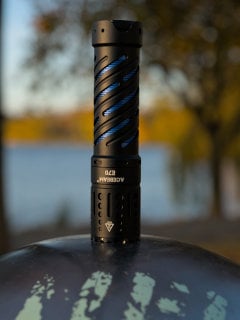So people throw out disposable vapes all the time. I cracked one open to take a look and it turns out they have a 18500 battery in it. So I was thinking of 3D printing a spacer to make it the same size as a 18650 and putting some shrink wrap on them. I just wanted to see what people who know more than me think. Is this a bad idea that is going to burn my house down? a waste of time perhaps?
I did a trial run in my wurkkos fc11 and they seem to work, it charges and looks just as bright.


This is just not true. The circuitry is in the flashlight, not the battery.
There is usually basic over discharge protection in the flashlight circuitry and over charge protection for lights with on light charging.
This usually works in conjunction with the protection circuit on the batteries.
18650 batteries (and other sizes) have become more wide spread because of the increased safety of protected batteries.
The batteries OP wants to use are unprotected cells who’s manufacturer is unknown, actual capacity is questionable and how they have been handled is unknown.
deleted by creator
As a rule of thumb flashlights only have LED driver in them and lack any sort of battery protection. Most 18650 batteries that you buy from reputable sources have built-in protection circuits. Cheap cells from ebay et al and recycled cells from old devices are a wildcard, they may or may not have the protection and you need to read the description very carefully or examine the cell in detail to see if it’s protected or not. IIRC, even most lithium cell chargers rely on the cell having built-in protection circuit.
I wouldn’t use unprotected cells for anything that I hold in my hand or put in my pocket/everyday carry. They’re literally marginally stable incendiary devices—I’d feel more safe with a block of C4 in my pocket than an unprotected lithium cell of questionable origin and history.
This hasn’t been true for a quite a while. Most Li-ion flashlights have a low-voltage shutoff.
Also not really true. Top-tier dealers like Illumn and Nkon offer both protected and unprotected options. Some popular flashlights (Zebralight, Emisar/Noctigon) only accept unprotected cells.
No charger anybody should be using relies on that. Correctly charging Li-ion requires tapering current after reaching the target voltage, which can’t happen if it trips a circuit breaker.
Maybe. Last time I was in market for a flashlight was 5 or so years ago. I don’t even have a use for handheld lights anymore.
I still won’t trust unprotected lithium cells for use in any device I carry on my person.
Really?
Is that why I can buy either protected or unprotected cells?
I just bought unprotected batteries for a project - I considered protected, but they were 2x+ the cost.